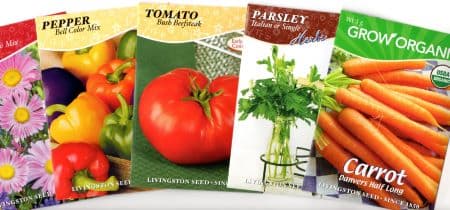Livingston Seed Company

About Livingston Seed Company
Livingston Seed Company was founded in 1850 by Alexander Livingston. Alexander. Livingston developed the first reliable tomato variety and cultivated a total of 31 varieties under the name “Buckeye Garden Seed Company”. The first of these was the Paragon, introduced in 1870.
Under Livingston, the Buckeye Garden Seed Company was the first to attempt seed hybridization of tomatoes. His hard work fine-tuned the tomato into the fruit we know today.
With the economic crash of 1876, the company filed for bankruptcy. It was Mr. Livingston’s son, Robert who reformed the company under the name “A.W. Livingston’s Sons” and continued his father’s success. In 1898, the company was incorporated as “Livingston’s Seed Company” and continued as a family-run business until 1979. Then, Alexander Livingston’s great-grandson, Alan, sold the business to Mr. Forest Randolph. He changed the name to “Superior Seed Company”, but Mr. Randolph’s ownership was brief. By 1980 Mr. Robert Johnston had acquired the company and changed the name back to the original company name.
The original company sold bulk seeds: grass seed, vegetable seeds, and flower seeds. As the company grew, they entered the packet seed market for home gardeners. They currently sell over 500 varieties of seeds, some of which are less common, yet sought after varieties.
Today, the company continues to search out new varieties for home gardeners.
Importantly: Home gardeners look for assurance that the seeds they acquire on the market are safe and healthy. Livingston seeds are non-GMO. That’s just what they want.
Garden Seed Trivia
The New England Shakers are believed to be the first to sell seeds in a paper packet. Several other companies claim to be the first. Those early companies were small and localized and focused upon vegetable seeds. Livingston began using seed packets in the mid-1800s. They followed the lead of Ferry Morse Seed Company. In addition to vegetables, the line of seeds expanded to cover flowers and herbs. The variety of packets was tailored to the growing conditions in each store’s vicinity.
Livingston Seed Company - More Seed Information
Without a doubt, you will find this article about the Livingston Seed Company useful. Please tell your gardening friends about us.
Please support our site. Shop for:
- rmmatthews100@hotmail.com
- 585-721-6528
- Rochester, NY
©1999-2024 GardenersNet.Com, All Rights Reserved

